|
|
|
Sort Order |
|
|
|
Items / Page
|
|
|
|
|
|
|
| Srl | Item |
| 1 |
ID:
155468
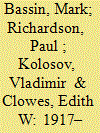

|
|
|
|
|
| Summary/Abstract |
The essays collected in this forum discuss the geopolitical legacy of the Russian Revolution of 1917, one of the most momentous political events of the twentieth century. From a range of different academic disciplines and perspectives, the authors consider how the profound transformations in society and politics were refracted through space and geography, and how enduring these refractions proved to be. The authors focus on three themes that have been dominant in Russian affairs over the past century: 1)the problem of center-periphery relations, 2)the civilizational dynamics of Russia’s self-identification in relation to Europe and to Asia, and 3)the geopolitics of national identity.
|
|
|
|
|
|
|
|
|
|
|
|
|
|
|
|
| 2 |
ID:
155473
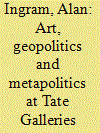

|
|
|
|
|
| Summary/Abstract |
Art galleries and museums have often been considered as sites at which the international and the political are both enacted and reworked. But how exactly does art ‘do’ geopolitics? Taking existing work on art and geopolitics in the gallery and museum as its departure point, this article advances a specific conceptual argument for how art does geopolitics that connects thinking in this area with broader debates in aesthetics and politics. Building on Jacques Rancière’s account of art as a dispositif, it explores the aesthetic politics – or metapolitics – through which artistic interventions have raised questions of oil within the Tate Galleries in London. Drawing out its ambiguities as well as potential critical implications, the article illustrates distinct ways in which the metapolitics of art may be activated via a discussion of The Robinson Institute, 2012, and of a series of interventions conducted since 2010 by the group Liberate Tate. In conclusion, the article draws out connections between the metapolitics of art and questions of governmentality.
|
|
|
|
|
|
|
|
|
|
|
|
|
|
|
|
| 3 |
ID:
155455
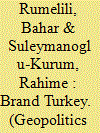

|
|
|
|
|
| Summary/Abstract |
Since the 2000s, Turkish policymakers and private sector interests have combined representations of Turkey as both Western and Eastern with a branding approach to identity in foreign policy, trade and investment promotion, and cultural sector activities. This article analyses how the commodification of its liminal identity as a dual identity allowed Turkey to invoke different aspects of its identity in the West and the East in ways that catered to both audiences and enabled the pursuit of different political and economic objectives. However, the article also notes how this branding strategy was limited by the national identity debates and dominant geopolitical discourses that continued to situate the West and East as mutually exclusive and binary opposite identity markers. Overall, the case of Turkey underscores the complex relationship between branding, identity, and discourse, which has thus far received scant attention in the literature.
|
|
|
|
|
|
|
|
|
|
|
|
|
|
|
|
| 4 |
ID:
155456
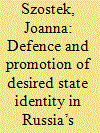

|
|
|
|
|
| Summary/Abstract |
This article examines how the Russian state promotes and protects its preferred self-identity, using the conceptual framework of ‘strategic narrative’. Nation branding practices, including state-funded ‘mega-projects’ like the Sochi Olympics, have contributed to the narrative by characterising Russia as a welcoming, attractive destination. However, a more salient feature of Russia’s strategic narrative is intense ‘anti-Western’ and ‘anti-American’ political and media discourse, formulated to defend against rival, threatening narratives projected from other countries. Through analysis of official statements and state television content, this article demonstrates how determination to protect ‘great power’ and ‘European’ identities underlay Russia’s strategic narrative in 2014. It considers responses which the narrative has prompted, arguing that desired results in domestic reception have been achieved at the expense of unsatisfactory results internationally. Heavy-handed attacks on the identities of other states boost collective self-esteem among Russian citizens, but they fail to produce – and arguably obstruct – desired responses among foreign audiences.
|
|
|
|
|
|
|
|
|
|
|
|
|
|
|
|
| 5 |
ID:
155453
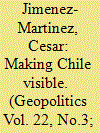

|
|
|
|
|
| Summary/Abstract |
Chile has become the paradigm of nation branding in Latin America, employing branding initiatives to try to shake off the uncomfortable past of Augusto Pinochet’s dictatorship, as well as to create a ‘new’ image that fits into a globalised and neoliberal world. Whilst there has previously been some analysis of Chile’s branding efforts, the viewpoints of the local actors involved in these initiatives have largely been ignored. This article addresses this issue, examining the tensions faced by different individuals who have taken part in nation branding in the country. Drawing on interviews with some of these individuals, this article examines three areas of tension: (1) the conflicting purposes guiding the practice of nation branding, (2) the difficulties around the operationalisation of nation branding and (3) the controversies regarding the intended audiences for their efforts.
|
|
|
|
|
|
|
|
|
|
|
|
|
|
|
|
| 6 |
ID:
155448
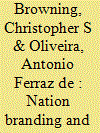

|
|
|
|
|
| Summary/Abstract |
To date, (critical) geopolitics has had little to say about contemporary competitive identity practices of nation branding in global politics, while existing analyses of nation branding in other disciplines have tended to overlook its geopolitical dimensions. This expanded Introduction (and the special section as a whole) therefore seeks to explore some of the implications of nation branding for geopolitics, while simultaneously utilising the insights of critical geopolitics to shed light on nation branding practices. The Introduction makes the case for a broad conception of nation branding that challenges claims it is immutably linked to capitalist logics in an era of globalisation. It subsequently explores claims that nation branding is simply an updated form of nation building and that it is also an inherently benign and peace promoting activity. The Introduction ends by highlighting how, despite claims that the contemporary prevalence of nation branding practices is indicative of a categorical shift from a geopolitical to a geoeconomic world, nation branding practices frequently remain deeply infused with rather traditional geopolitical scripts.
|
|
|
|
|
|
|
|
|
|
|
|
|
|
|
|
| 7 |
ID:
155458
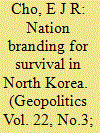

|
|
|
|
|
| Summary/Abstract |
The article problematises a popular view in nation branding literature that equates nation branding with states’ attendant advertising campaigns. Instead, this article adopts a broader perspective that nation branding can also operate as a policy aimed at enhancing the sense of ontological security among states and as a practice to strengthen the position of the ruling regime by targeting particular audiences within a broader ‘strategic narrative’. From this perspective, this article aims to shed new light on non-liberal capitalist countries’ – specifically North Korea’s – attempts at nation branding policies in terms of various nation branding strategies. In so doing, Clifford Geertz’s anthropological concept of ‘theatre state’ is introduced as an important metaphor to broaden the existing understanding of nation branding by highlighting the unique characteristics of North Korea’s policies of nation branding and nation building. It is argued that great national spectacles such as the Arirang Festival and military demonstrations provide North Korea with a useful platform for participating in the identity competition among other nation states, as well as in the fierce recognition game against the rest of the Korean national community. Obviously, these strategic performances have contributed to communicating with the outside world, deliberately seeking more respect from others, but have simultaneously operated as nation building processes. Therefore, this work concludes that such staged events are sophisticatedly designed to enhance North Korea’s complex interest of nation branding, and, more importantly, argues that techniques and practices of nation branding are neither historically new nor confined to Western liberal capitalist regimes.
|
|
|
|
|
|
|
|
|
|
|
|
|
|
|
|
| 8 |
ID:
155454


|
|
|
|
|
| Summary/Abstract |
How does nation branding reflect state–society relations and more pertinently, what does it reveal about the way political power is legitimated by a given state and why? This question seldom receives attention in the rapidly expanding scholarship on nation branding. This article examines and interprets national branding processes in post-apartheid South Africa within the context of larger efforts by political elites to legitimate the new state and society and to address some of the complex legacies of the apartheid past. These efforts targeted domestic and international audiences in distinctive ways, intertwined foreign and nation-building policies, and sought to communicate key ideas about South Africa as state and nation and about the state’s role in the wider world order. The article considers how different groups of state-linked actors participated in exercises of legitimation and the discursive mechanisms that were relied on. Three such mechanisms are highlighted: (i) the construction of a distinct African-style modernity (here termed Afro-modernity); (ii) claims of South African exceptionalism articulated in boosterist branding campaigns; and (iii) expressed, variously through foreign policy signals, diplomatic posturing and hallmark events, the projection of a national role conception as leader on the African continent and of the Global South. These compound political processes had ambivalent and incomplete outcomes, however. This article considers why and what the implications are for the South African state and its society.
|
|
|
|
|
|
|
|
|
|
|
|
|
|
|
|
| 9 |
ID:
155462
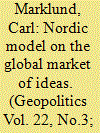

|
|
|
|
|
| Summary/Abstract |
This article analyses the contemporary deployment of the Nordic welfare state model as a centrepiece of Nordic competitive identity and strategic communication on the global market of ideas. First, it looks at the interrelated phenomena of global competition, competitive identity and region branding. Second, it studies the interplay between Nordic transnational public diplomacy and national public diplomacy of individual Nordic countries, in particular Sweden, on the one hand and international media outlets’ reporting on the Nordic countries on the other. In analysing this cross-fertilizing genre, the article identifies how the welfare state is being repackaged for export along with a set of “progressive values” which are coded as specifically “Nordic.” The article discusses (1) the interaction between outer images and inner visions; (2) the place and significance of the Nordic model, progressive values and the welfare state in today’s Nordic branding; and (3) the possible function of outward competitive identity as a kind of “compensatory imagination” directed inward as well as outward.
|
|
|
|
|
|
|
|
|
|
|
|
|
|
|
|
| 10 |
ID:
155472


|
|
|
|
|
| Summary/Abstract |
This article links two major areas of work on the geographies of oil: socially produced scarcity and the ‘new realities’ of oil, with wider geographical inquiries, mainly global energy governance. It explores how in the current context characterised by oversupply, power stands out as a key factor in the geopolitics of prices, the interactions amongst energy institutions, the role of supply and demand, and the preferences of the actors involved. Geopolitical approaches find a niche in the gaps left by the increasing complexities of global energy governance. In this regard, energy geopolitics may be thought of as ‘governance by other means’, an alternative to failed external energy governance solutions. The article then focuses on the consequences of the drop in oil prices on producer countries and how it will impact the major issues that dominate the literature on energy security. It concludes by stating that there is a need to rethink the geopolitics of energy security in order to incorporate the global governance institutions’ failure to facilitate cooperation as another cause of the re-securitisation of energy policies.
|
|
|
|
|
|
|
|
|
|
|
|
|
|
|
|
| 11 |
ID:
155465
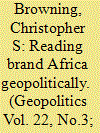

|
|
|
|
|
| Summary/Abstract |
In 2010, the ‘Brand Africa’ initiative was launched with the mission to transform perceptions of Africa from a continent of calamities into one of promising economic prospects and entrepreneurial populations. This transformation, ‘Brand Africa’ claims, is one where Africans take their representation from the hands of foreigners and make, through a new image, their own (hi)story. In this respect Brand Africa can be interpreted as a form of subaltern geopolitics seeking to subvert dominant geopolitical knowledge and to fight established structures of domination. However, the article argues its subversive elements are limited, especially when compared to the historical discourses of decolonial pan-Africanism upon which it draws for legitimacy. Indeed, while appropriating this legacy Brand Africa offers up a very different geopolitical vision of possible/desirable African futures. It is argued that this may be accounted for by understanding the extent to which the Brand Africa initiative appears embedded within a South African national context and its own geopolitical ambitions evident within its own nation branding project. What this highlights in turn is that the emancipatory potential and assumed synergies between national and supranational branding central to the Brand Africa initiative are not as unproblematic or uncontested as claimed.
|
|
|
|
|
|
|
|
|
|
|
|
|
|
|
|
|
|
|
|
|